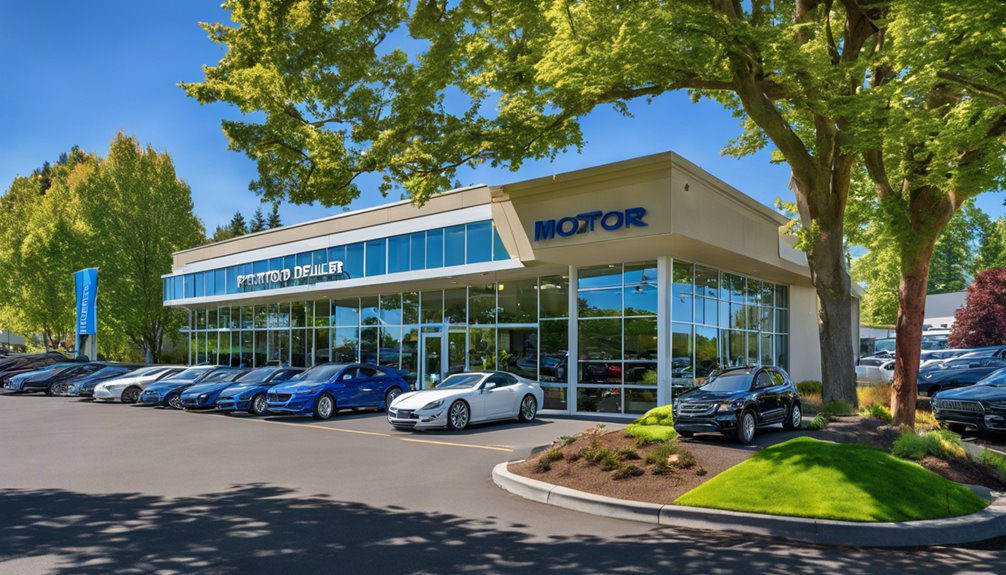If you're considering operating a motor vehicle dealership in Oregon, understanding the Motor Vehicle Dealer Bond is essential. This bond not only protects consumers but also establishes your credibility in a competitive market. You'll need to navigate various legal requirements and financial implications to secure it properly. What happens if you don't comply with these regulations? The consequences could impact your business more than you think, and knowing the ins and outs can make all the difference. Let's explore what you need to know to stay compliant and protect your interests.
Understanding Motor Vehicle Dealer Bonds

Motor vehicle dealer bonds are often essential for anyone looking to operate a dealership in Oregon. These bonds serve as a financial guarantee that you'll comply with state regulations and operate your business ethically.
When you secure a bond, you're promising to conduct your dealership in accordance with the law, which gives consumers a level of protection. As a dealer, you'll need to obtain this bond to obtain your license and ensure you're held accountable for your actions.
If you fail to meet your obligations, your bond protects customers from financial losses, allowing them to file claims against it. This means you'll need to choose a reputable bonding company to work with, as they'll assess your financial history and business practices before issuing the bond.
Understanding the requirements and costs involved is crucial, as these factors can vary based on your creditworthiness and the amount of the bond. Claims can be made against the bond for unethical actions, reinforcing the importance of maintaining ethical business practices.
It's essential to do your homework and shop around for the best rates and terms that fit your dealership's needs. By grasping the ins and outs of motor vehicle dealer bonds, you'll be better prepared to navigate the complexities of starting your dealership in Oregon.
Importance of the Bond
The importance of the bond can't be overstated when operating a dealership in Oregon. This bond serves as a financial safety net, protecting your customers and the state from potential financial losses caused by dishonest practices or regulatory violations.
When you hold a motor vehicle dealer bond, you demonstrate your commitment to ethical business operations, which can enhance your dealership's reputation and build trust with your clientele.
Additionally, the bond ensures that you adhere to the rules and regulations governing vehicle sales in Oregon. By maintaining this bond, you not only comply with state requirements but also create a level of accountability in your business.
If a customer encounters issues, they can file a claim against the bond, allowing them to recover losses up to the bond amount.
Furthermore, having a dealer bond can also help you access better financing options and insurance rates. Lenders and insurers view bonded dealers as lower risk, which can lead to more favorable terms.
Ultimately, the bond is more than just a legal requirement; it's a crucial element of your dealership's credibility and operational success. Without it, you risk jeopardizing your business and your customers' trust. Moreover, it acts as a guarantee to protect the public, emphasizing the importance of compliance with licensing laws.
Legal Requirements in Oregon

When you decide to operate a dealership in Oregon, understanding the legal requirements is crucial for your success.
First, you'll need to obtain a dealer's license from the Oregon Department of Transportation (ODOT). This involves submitting an application, paying the required fees, and providing necessary documentation, such as proof of a physical business location and identification.
You'll also need to establish a motor vehicle dealer bond. This bond protects consumers and serves as a financial guarantee for your business practices. Home dealer bonds are essential for ensuring compliance with consumer protection laws and ethical operation.
Additionally, it's essential to comply with local and state regulations regarding vehicle sales, including adhering to advertising rules and maintaining proper records of transactions.
Don't forget to familiarize yourself with the Oregon Vehicle Code, which outlines specific laws related to motor vehicle sales. Training your staff on these regulations will help avoid costly penalties.
How to Obtain a Bond
Securing a motor vehicle dealer bond in Oregon is a straightforward process that can set your dealership on the right path.
First, you'll need to determine the bond amount required for your specific dealership type, as this can vary based on your business model and the number of vehicles you intend to sell.
Next, you'll want to research and choose a reputable bonding company or surety provider. It's essential to read reviews and ensure the company has a solid track record in the industry.
Once you've selected a provider, you'll fill out an application, which typically includes basic business information and your personal credit history.
After submitting your application, the bonding company will evaluate your financial stability and assess any risks associated with issuing the bond. They may require additional documentation, so be prepared to provide that.
Once approved, you'll pay any required premium, and the surety will issue your bond.
Costs Associated With the Bond

How much can you expect to pay for a motor vehicle dealer bond in Oregon? The cost typically ranges from 1% to 15% of the bond amount, depending on several factors like your credit score, business history, and financial stability. For a standard bond amount of $40,000, you might pay anywhere from $400 to $6,000 annually.
Your credit score plays a significant role in determining your premium. If you have excellent credit, you can secure a lower rate, while poor credit could push your costs higher. Additionally, if you've been in the business for years and have a solid financial background, you might qualify for better pricing.
It's also essential to consider any additional fees associated with obtaining the bond. Some companies may charge administrative or application fees, so be sure to read the fine print.
Also, remember that bonding companies might offer discounts for multiple bonds or long-term commitments. Compliance with bond requirements enhances agency credibility and trust with clients and debtors, which can also influence your overall costs.
Comparing quotes from various bonding companies will help you find the best deal. This way, you can ensure that you're not only compliant with state regulations but also getting the most value for your investment.
Renewal and Maintenance of the Bond
Maintaining your Oregon motor vehicle dealer bond is crucial for staying compliant and protecting your business. To keep your bond active, you'll need to renew it periodically, typically on an annual basis. This renewal process ensures that you continue to meet the state requirements and have the necessary coverage for your operations.
Start by reviewing your bond's expiration date and preparing for renewal well in advance. Contact your surety bond provider to understand any changes in premiums or requirements, as these can fluctuate based on your business's financial status or claims history. You may need to submit updated documentation, such as financial statements or proof of continued licensing.
Make timely payments for your bond renewal to avoid lapses in coverage. If you let your bond expire, you risk non-compliance with state regulations, which could lead to penalties or disruptions in your business operations.
Additionally, maintain a good relationship with your surety provider. Communication can help you stay informed about any changes in laws or practices that might affect your bond.
Consequences of Non-Compliance

Non-compliance with Oregon's motor vehicle dealer bond requirements can lead to serious repercussions for your dealership. Failing to maintain an active bond can result in your dealership facing fines, penalties, or even suspension of your dealer license. Without a valid bond, you'll be unable to legally operate, severely impacting your business and revenue.
Additionally, if you don't comply, you risk losing credibility in the industry. Clients and suppliers may hesitate to work with you if they find out you haven't met the necessary bonding requirements. This can lead to a decline in sales and potential partnerships, ultimately hurting your bottom line.
Moreover, regulatory authorities could initiate investigations or audits, which can be time-consuming and costly. If violations are found, you might face legal consequences, including lawsuits from consumers or claims against your bond. Louisiana surety bonds serve a similar purpose in ensuring compliance and protecting local governments from financial loss.
In short, non-compliance can create a snowball effect that jeopardizes your dealership's reputation and financial stability. To avoid these outcomes, it's crucial to stay informed and ensure your motor vehicle dealer bond is always in good standing.
Don't let lapses in compliance jeopardize your success.
Conclusion
In conclusion, securing an Oregon motor vehicle dealer bond is essential for your dealership's success. Not only does it protect consumers and enhance your reputation, but it also ensures you comply with state regulations. By understanding the bond's importance and following the steps to obtain and maintain it, you can foster trust with customers and pave the way for a thriving business. Don't underestimate the value of this bond—it's a crucial investment in your dealership's future.

